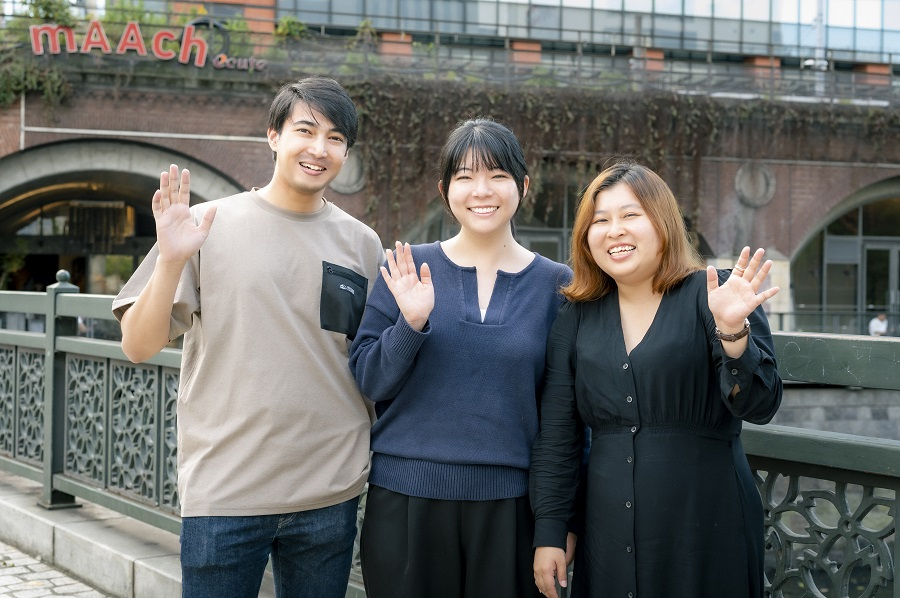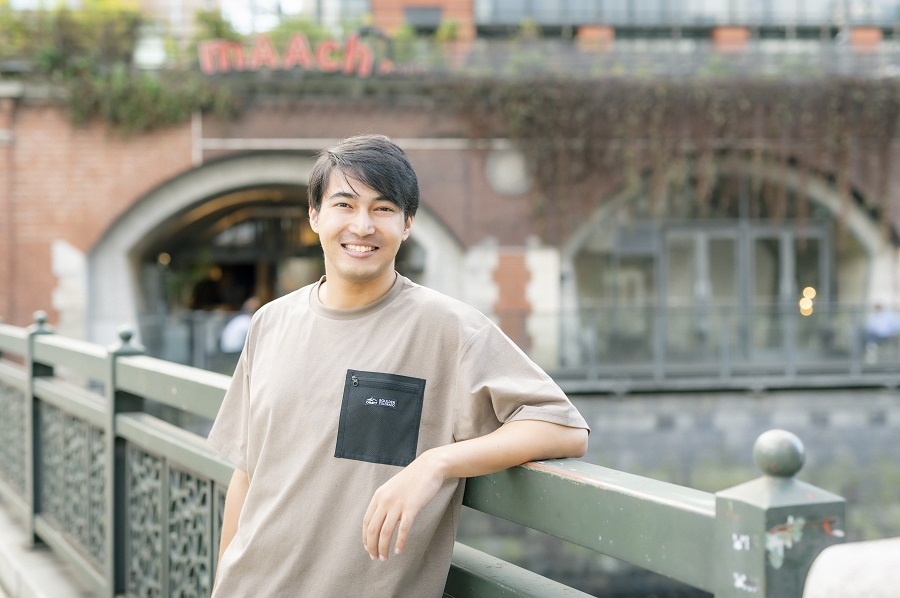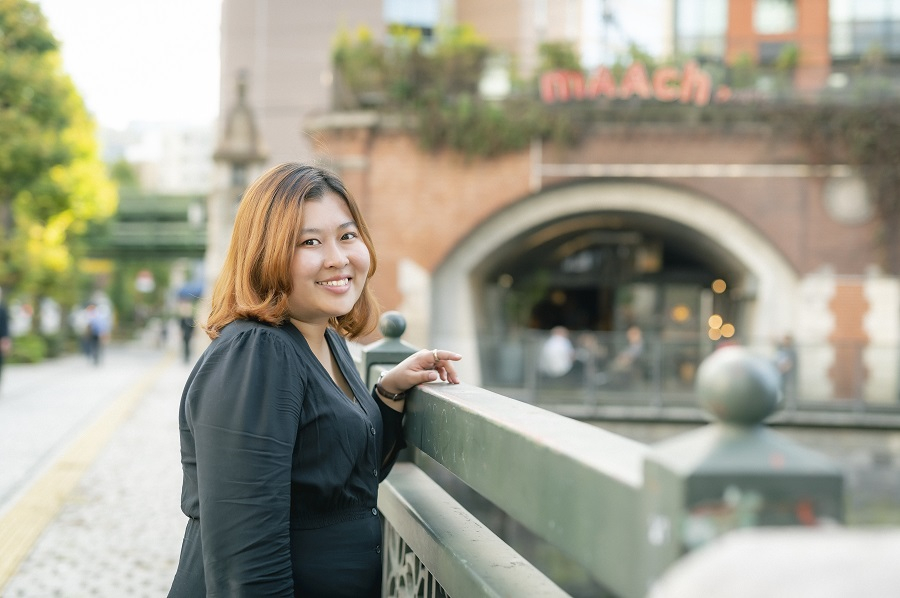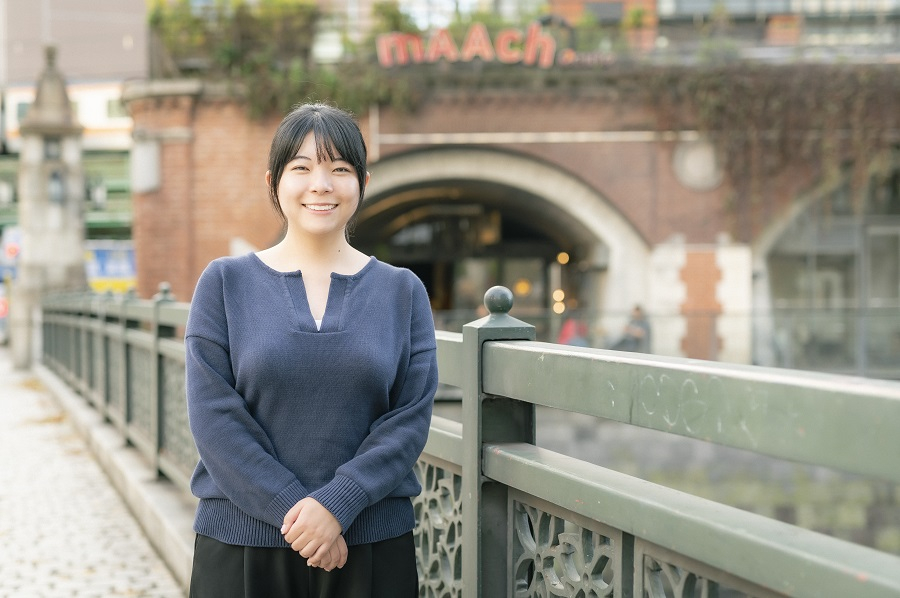Intercultural Crosstalk
A Conversation with Young People Connecting Japan to the World -About Identity-

See their profiles here
Click for "1st Round" HereRound 3: About Identity
In this 3rd session with the youth connecting Japan to the world, we discussed "About Identity".
There might be cases where people feel hurt by seemingly innocent questions like, "Are you half?"
Their experiences crossing borders, living amidst different languages and cultures from a young age, lead to deep identity reflections on "Who am I?"
As adults, Pragyan, Sabrina, and Yuko have come to embrace their identities. They share their journey and feelings during this process.
What Do You Answer When Asked, "What Country Are You From?"

If you ask me my country of origin, I will say Nepal.
What is your country? It's a little tricky for me to answer.
If they ask me "What country do you come from?", I would answer that I am Peruvian, Brazilian, and Japanese.
If they ask me where I am from, I will say Peruvian, and if they ask my nationality, I will say Brazilian.
Part of it is that the word "country" is not clear to me in the first place, and I wonder what makes it a country. The place where I grew up and my hometown is definitely Taiwan, so I say I was born and raised in Taiwan.
Q: When trying to get to know someone, there are many ways to ask questions, such as, "What is your country?", "Where are you from?", or "What is your nationality?". But how do you find it easier to answer?
Asking about origin is easier because there's only one answer.
It gets tricky when asked about origin. I was born in Japan, so people get surprised, but it's a good conversation starter.
Me too. When I tell people that I'm from Peru, the usual conversation starts with, "Aren't you Japanese?".
That's definitely going to happen. I don't want to lie either, so I'll just say Taiwan.
Q: There are many different ways to refer to young people with foreign connections. How do you all talk about yourselves?
I consider myself an immigrant because my grandparents went to South America as immigrants and came back to Japan. However, Japan does not use the word "immigrant" very often, so I am often defined as a foreigner. When I talk about my roots, I say mixed, because I have roots in five different countries.
I am often asked if I am half-Japanese. I was joking and said "double", but it turns out that "double" is really being used these days. My family has been in Japan for over 20 years, so I think we can call ourselves immigrants. If you don't use the word "immigrant", you can use the word "foreigner".
I don't think [I am] an immigrant, but I think every day, "Then what am I?" If I had to describe myself in words, I would use "mix". I think that is the closest I can get.
I have been told that I am a crossbreed, but I didn't like that.
At first, when I was in Taiwan, I called myself half. As I read books and learned more about how the word "half" was used and the image it had, I began to use other words to describe myself, such as "mixed" or "double".
There are many ways to say this, but I think it's important not to be discriminatory. I think it's best to use the word that the person chooses, rather than having others decide on what to call them.
At What Age Did You Start Thinking About Identity, Roots, etc.

I haven't really struggled much with my identity. I think maybe it's because I've taken advantage of the uniqueness of being a young person connected to a foreign country. It's an escape route, isn't it? If I couldn't do something, I might have used the fact that I'm a foreigner as an excuse, or used it to get a laugh.
I started to struggle with my identity after coming to Japan.
In Brazil, there is a diversity of hair and skin colors. Even though there are people with various roots, everyone speaks Portuguese, and everyone is Brazilian. In Japan, my nationality, place of birth, and appearance are different from what many people imagine a 'foreigner' to be, so people want to understand and often ask me what my ethnicity is. Each time, I feel like I'm being asked to define who I am, and that's why I think I've started to struggle with my identity.
It started when I was around 3 to 4 years old. In Taiwan, there are kindergartens similar to Japanese ones, where Taiwanese children learn Japanese, and Japanese children learn Chinese. Despite having a Japanese name, 'Yuko', I was placed in the class for Taiwanese children to learn Japanese. I remember thinking, 'Huh?' It was a clear memory for me. I wondered if this kind of categorization was something that would continue throughout my life.
In South America, I'm categorized as a child of Japanese descent (or Nikkei). But in the Amazon where I grew up, there were no Japanese or Nikkei people, so I wasn't exposed to Japanese culture. I've never felt a strong sense of identity with Japan. The things I miss or feel nostalgic about are in South America.
I was only in Japan for 2nd and 3rd grade of elementary school, and during that time, I completely forgot how to speak Nepali. So, when I returned to Nepal, I was called a 'foreigner' by the other kids, which was a bit upsetting. Gradually, I started to remember Nepali as I lived there, but when I came to Japan for high school, I was called 'foreigner' here as well. It made me think that no matter where I go in the world, I'll always be seen as a foreigner. Even now, when I go back to my country, I'm still called a foreigner.
Yes, that's right.
Every time I travel, my passport is Brazilian, but it states I was born in Peru, and I look Japanese. No matter where I go, I'm judged as a 'foreigner,' which always made me wonder who I really am. My identity is like a Jenga tower, intricately assembled, and if you remove any part, I'm no longer myself. I experienced an identity crisis when I was in university. I managed to overcome it by meeting and talking to people with similar experiences in university and during internships. Finding peers who can understand you is incredibly important.
Words I Want to Share with My Juniors Connected to Foreign Countries

I can now think that I am glad that I am who I am.
Yes, I think I am fine the way I am now.
I believe that all experiences are meaningful, regardless of whether they are multilingual or multicultural. If I were to speak to my past self, I would say that it is a discipline to improve my humanity.
I would also tell people who have grown up in the same environment as I did, or who have had the same kind of loneliness. If you can overcome this, you will be the strongest.
I think that, back when I was struggling with my identity, I was too caught up in feeling like I had to conform to others, to provide the kind of answers others expected of me. Now I believe that I should have just accepted myself as I was. I want to tell my past self that it's okay to just be yourself.
When I was in junior high school, I met a teacher who was a mix of German and Japanese. At the time, my result in Japanese class were not improving at all, and I was suffering from the pain of being halfway in everything I did and not being able to tell anyone. The teacher understood this and told me, "Having two languages and two cultures means you have two engines, and since you have two engines, it will take time for them to start, but once they start, no one can beat us". Those words saved me, and here I am today.
That's a great teacher.
We Love Japan and Want It to Be a Better Place to Live for All Kinds of People.

I really do like Japan.
I like it too. The food is good, there are washlets (Japanese toilets) and public baths.
I think so too. I feel like I can't go to another country.
I love Japan, and I hope that it becomes more accommodating for people like myself.
There are many people of Japanese descent (Nikkei) who come here to earn a living but end up feeling disenchanted with Japan and choose to return home. Many Nikkei people take great pride in their Japanese roots, and yet, when they come to Japan, they are labeled as 'foreigners' or 'not Japanese.' I once heard someone say they returned because "Japan might be economically rich, but it's spiritually poor". That sentiment struck me as incredibly sad, but I can understand it to some extent. It's hard to gain acceptance from those around you, to always be treated as a foreigner, and sometimes to be asked for an opinion as though you represent Peru. I stay in Japan with the hope that it will become a place where a variety of people can live comfortably.
Q: Do you have any plans to travel back and forth between Japan and your countries in the future?
I'm in my ninth year of living in Japan, and all my close friends are here. I don't think I'll return to Taiwan for my future career. I will continue to be connected to Taiwan as ‘a place to return to because my family is there’.
I may visit my parents when they return to South America, but it is not my desire to return at this time. I want to do something that will give people like me more options in Japan. When I feel that I have reached the point where I can do as much as I can, I would like to eventually return to the Amazon. I will never forget living in nature.
Many people in Nepal migrate to other countries, and the only ones who remain are my grandparents, where my friends and relatives, including my family, are in many parts of the world. In this situation, there is no possibility for me to return to Nepal at this moment. My parents would like to go back though.
Q: Have you ever thought about naturalization?
I want to naturalize, but it's a bit difficult because my parents oppose it; they want me to live as a Nepali. I sometimes go abroad for research, but I always have to apply for a visa. I would like to be able to vote in elections.
I received a notification just when I became eligible for naturalization. At the time, I was struggling with my identity and felt that returning my passport would mean losing something that represents it. Now, I feel maybe I don't need to be so concerned about it.
If I think about raising children in Japan, I would like to naturalize. It would be hard for my children, and my partner would also have difficulties with international marriage. But because naturalization requires various documents and seems to be a lot of trouble, until then, I'm thinking maybe I don't need to naturalize.
We are often referred to as 'young people connected to foreign countries,'but I see us as young people connected to Japan in various ways. When I say I'm from Taiwan, people ask if I'm Taiwanese, but I wish more people understood that it's not about being distinctly 'Japanese' or 'Taiwanese.' There are many of us with diverse connections to Japan, and I hope that's something more people come to recognize.
How was the third roundtable discussion?
We met three young individuals each connected to Japan in their own unique way.
Despite periods of struggling with their differences from others, they have found peers who accept them for 'who they are' rather than 'what they are.' Now, they turn these experiences into their strengths, aiming to support juniors with similar backgrounds.
This concludes this three-part series. Next time, we will move on to a roundtable discussion featuring "Foreign Workers in Restaurants".
